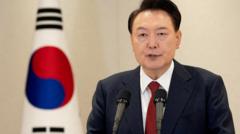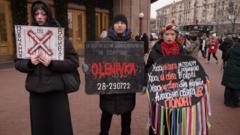As her presidency nears its end, Georgian President Salome Zourabichvili defies the ruling party's electoral decision, alleging a coup by the Georgian Dream party. With escalating tensions and threats of legal action looming, Zourabichvili's steadfastness reflects larger national debates about sovereignty, Europe, and Russia.
Georgia's Pro-Western President Faces Constitutional Crisis as Term Ends

Georgia's Pro-Western President Faces Constitutional Crisis as Term Ends
Salome Zourabichvili stands firm against government demands to leave office, provoking a potential showdown in Georgia's political landscape.
Georgia's pro-Western president, Salome Zourabichvili, is at the center of a political storm as she refuses to step down despite the expiration of her term. The former diplomat argues that she embodies the last reputable institution in Georgia as she confronts the ruling Georgian Dream party, which has moved to install Mikheil Kavelashvili as her successor. Zourabichvili, whose presidency was originally endorsed by Georgia Dream, has since criticized the party's recent actions, describing them as detrimental to the nation's sovereignty and likening them to a "Russian special operation."
Born in France to a Georgian exile family, Zourabichvili's deep-seated ambition centers on aligning Georgia with Western ideals. Throughout her career, she has been viewed as a pro-EU figure, leading rallies against Russian influence while sometimes clashing with her party's leadership. Her presidency has seen a crackdown on civil society, and she has vocally opposed legislation viewed as dovetailing with Russian governance strategies, portraying them as a choice between freedom and subservience to Moscow.
With her term concluding, the imminent challenge of transitioning power to Kavelashvili raises questions surrounding the legitimacy of the electoral process—Zourabichvili has condemned the solitary candidate election that brought Kavelashvili to power. Tensions peaked when she confronted riot police during protests, questioning their allegiance to the country’s sovereignty.
Despite her past affiliations with the ruling party, Zourabichvili has gained a following that sees her as a rebel figure against authoritarianism, prompting fears among officials that removing her from office could martyr her political stature. Opposition figures recognize her as a key player for pro-European movements, regardless of the government's potential actions against her.
Amidst threats from Prime Minister Irakli Kobakhidze and discussions of her possible impeachment, Zourabichvili's steadfast refusal to relinquish power heralds a constitutional crisis, echoing Georgia's broader struggle over its identity and direction amid external influences. The outcome of this power struggle may have lasting consequences for Georgia’s democratic prospects and its relationship with Europe and Russia.
Born in France to a Georgian exile family, Zourabichvili's deep-seated ambition centers on aligning Georgia with Western ideals. Throughout her career, she has been viewed as a pro-EU figure, leading rallies against Russian influence while sometimes clashing with her party's leadership. Her presidency has seen a crackdown on civil society, and she has vocally opposed legislation viewed as dovetailing with Russian governance strategies, portraying them as a choice between freedom and subservience to Moscow.
With her term concluding, the imminent challenge of transitioning power to Kavelashvili raises questions surrounding the legitimacy of the electoral process—Zourabichvili has condemned the solitary candidate election that brought Kavelashvili to power. Tensions peaked when she confronted riot police during protests, questioning their allegiance to the country’s sovereignty.
Despite her past affiliations with the ruling party, Zourabichvili has gained a following that sees her as a rebel figure against authoritarianism, prompting fears among officials that removing her from office could martyr her political stature. Opposition figures recognize her as a key player for pro-European movements, regardless of the government's potential actions against her.
Amidst threats from Prime Minister Irakli Kobakhidze and discussions of her possible impeachment, Zourabichvili's steadfast refusal to relinquish power heralds a constitutional crisis, echoing Georgia's broader struggle over its identity and direction amid external influences. The outcome of this power struggle may have lasting consequences for Georgia’s democratic prospects and its relationship with Europe and Russia.



















